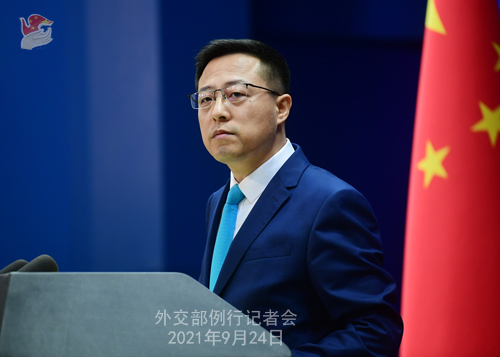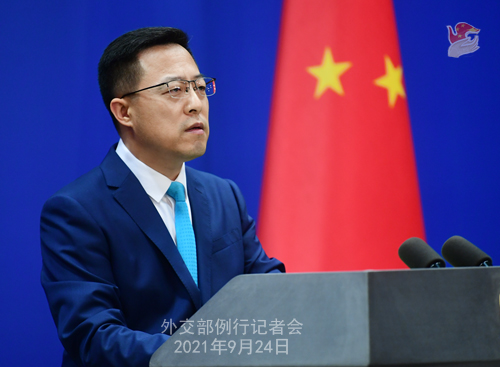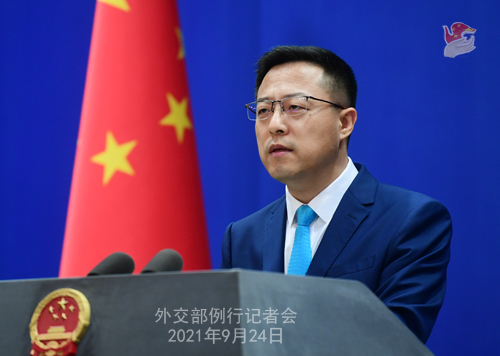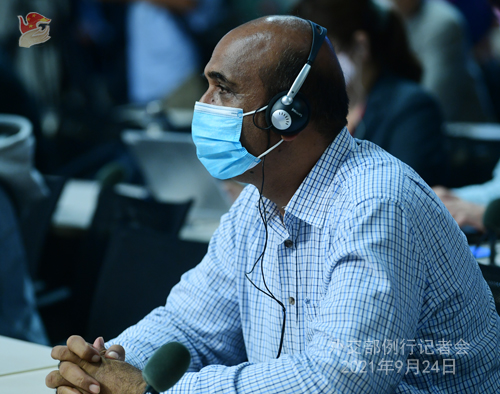
CCTV: Today, China's foreign ministry published on its website the Fact Sheet: US Interference in Hong Kong Affairs and Support for Anti-China, Destabilizing Forces. Do you have further comments?
Zhao Lijian: The Fact Sheet: US Interference in Hong Kong Affairs and Support for Anti-China, Destabilizing Forces gave a systematic review of the misdeeds of US interference in Hong Kong affairs and other China's internal affairs since the turbulence over the amendment bill in Hong Kong in 2019, which includes enacting Hong Kong-related bills, blatantly imposing sanctions, making unfounded charges against HKSAR affairs, shielding and supporting those anti-China, destabilizing forces and colluding with some countries to exert pressure.
Hong Kong is a Special Administrative Region of China. Hong Kong affairs are purely China's internal affairs, in which no country has the right to interfere. The enactment and implementation of the Law of the PRC on Safeguarding National Security in the HKSAR has improved the rule of law in Hong Kong, restored security and stability in Hong Kong, protected the legitimate and lawful rights and interests of Hong Kong residents, and helped Hong Kong to achieve the turnaround from chaos to stability. The US attempt to play the "Hong Kong card" to undermine Hong Kong's prosperity and stability and contain China's development is doomed to fail.
The US side should earnestly respect China's sovereignty, abide by international law and basic norms governing international relations, stop meddling in Hong Kong affairs, stop undermining the rule of law in Hong Kong, and stop interfering in China's internal affairs. It must refrain from supporting and emboldening anti-China, destabilizing forces. Otherwise, it would only shoot itself in the foot and end up severely hurting its own interests in Hong Kong. China will make firm and strong reactions to US interference in Hong Kong affairs.
Hubei Media Group: According to reports, on September 21, Iranian President Ebrahim Raisi in his statement at the general debate of the UN General Assembly denounced US willful withdrawal from the JCPOA and its sanctions on Iran amid COVID-19. He also said all parities should faithfully implement the JCPOA and UN Security Council Resolutions. What is China's comment?
Zhao Lijian: China noted that President Raisi declared in his statement that "nukes have no place in our defence doctrine", called for all parties to stay true to the JCPOA, and said that dialogues aimed at removing all sanctions on Iran are beneficial. China appreciates this, and believes it shows Iran's constructive attitude of upholding the JCPOA and supporting negotiations to resume compliance.
China always believes that resuming full and effective implementation of the JCPOA meets common interests of all parties. As the one that started the new round of tensions in the Iranian nuclear situation, the US should redress its wrong policy of maximum pressure on Iran, lift all illegal sanctions on Iran and measures of long-arm jurisdiction on third parties, and work to resume negotiations and achieve outcomes at an early date. China will work with all parities and continue to make relentless efforts to bring the JCPOA back onto the right track.
MASTV: Prime Minister Yoshihide Suga mentioned the issues of the East China Sea, the South China Sea and economic coercion in a meeting with Indian Prime Minister Narendra Modi. Some media say these remarks seem to be hinting at China. Do you have any comment?
Zhao Lijian: "Lying diplomacy" and "smearing diplomacy" are not constructive at all and must be put to a stop. China is firmly committed to safeguarding its territorial sovereignty and maritime rights and interests. China is ready to continue to properly handle differences with countries concerned through consultation and negotiation. The origin and headquarters of the so-called "economic coercion" are in Washington D.C.. China does not wantonly bully others and impose sanctions, exercise long-arm jurisdiction, or arbitrarily oppress foreign companies. China can by no means be accused of "economic coercion".

The Paper: The High-level Meeting of the UN General Assembly to Commemorate the 20th Anniversary of the Adoption of the Durban Declaration and Programme of Action was held on September 22. We noticed the US and a few other Western countries were absent from the meeting. What is China's comment?
Zhao Lijian: The Durban Declaration and Programme of Action is a banner for the global anti-racism movement and a shared commitment of all countries. The US and a few Western countries blatantly rejected and were absence from the meeting. This invites suspicion over their will to oppose racism and participate in international anti-racism cooperation.
It was exactly these countries that committed genocide against indigenous people, and adopted colonist, invasive and exploiting policies overseas. In the 21st century, severe racial discrimination, hate crime, judicial injustice, wealth gap and other problems still plague these countries. Tragedies of "I can't breathe" is heartbreaking. These countries should face the inglorious history squarely, take real actions to eliminate racism and fundamentally improve the living conditions of minorities. They should not stay evasive, or even be afraid of making a gesture.
Eliminating racism in all its forms and ensuring that everyone is equal in dignity and rights is the spirit of the UN Charter and a manifestation of international fairness and justice. The international community should adopt a zero-tolerance attitude toward racism, break the vicious cycle of social inequality and racism, and leave no individual and no country behind.
China supports the Durban Declaration and Programme of Action and will continue its implementation. China will work with all countries in unrelenting efforts to eliminate racism and build a world of equality for all.
NHK:The US, Japan, Australia and India will hold a security dialogue in the US and discuss issues including a response to China's growing impact in the Asia-Pacific. Do you have any comment?
Zhao Lijian: China always believes that any regional cooperation mechanism should not target or harm the interests of a third party. A closed, exclusive clique targeting other countries runs counter to the trend of the times and the aspirations of regional countries. It will find no support and is doomed to fail.
China has always been an advocate of world peace, a contributor to global development, a defender of the international order and a provider of public goods. The growth of China's strength means the growth of force for world peace. As a responsible major country, China's contribution to peace, stability and prosperity in the Asia-Pacific region and the world is there for all to see. Relevant countries should view China's development in a correct light and do more to promote solidarity and cooperation among countries in the region.
Associated Press of Pakistan: On September 23, the 10th Joint Coordination Committee meeting of China Pakistan Economic Corridor was held via video link. Senior officials from Pakistan and China attended it. I wonder if you have any comment on it?
Zhao Lijian: On September 23, the 10th meeting of the Joint Cooperation Committee (JCC) on the China Pakistan Economic Corridor (CPEC) was held via video link. Leaders of China's National Development and Reform Commission and Pakistan's Ministry of Planning, Development and Special Initiatives co-chaired the meeting, which was attended by about 200 representatives from government agencies, financial institutions, enterprises and public institutions of the two countries. At the meeting, the two sides announced the establishment of a joint working group on information technology industry, signed a number of cooperation documents and announced the signing of cooperation agreements between enterprises. Congratulations on the successful meeting and relevant outcomes!
China and Pakistan are all-weather strategic partners of cooperation. The CPEC is a landmark and pilot program under the Belt and Road Initiative (BRI). Since its launch in 2013, the CPEC has achieved fruitful and remarkable results. China is ready to work with Pakistan to earnestly implement the important common understanding reached by the leaders of the two countries and the outcomes of the JCC meeting. We will stick to the "1+4" cooperation model centering on the CPEC and focusing on Gwadar Port, energy, infrastructure development and industrial cooperation, in an effort to increase the utilization rate of existing infrastructure. We will highlight the cooperation in health, green economy and digitization, step up cooperation in industries, science and technology, agriculture and people's livelihood, so as to build the CPEC into a demonstration program of high-quality development under the BRI, thus contributing to the building of an even closer China-Pakistan community with a shared future in the new era.

Bloomberg: India has recently reorganized its military into four theater commands, with one in the east that faces China. Does the foreign ministry have a comment on this? And related to that, India is considering new border management protocols because previous ones, such as keeping small arms pointed toward the ground when foot patrols meet each other on the disputed border to prevent an accident, are not working, in India's view at least, anymore. Does China think there is a need for new border management protocols?
Zhao Lijian: Over the years, a series of treaties and agreements signed by China and India on maintaining peace and tranquility along the Line of Actual Control (LAC) have played an important role in upholding stability along the China-India border. The Galwan Valley incident last year was caused by the Indian side's illegal trespass of the LAC to encroach on Chinese territory, in violation of previously-signed treaties and agreements. We hope that the Indian side will strictly abide by relevant treaties and agreements signed by the two countries and take concrete actions to safeguard peace and stability in the China-India border areas.
Global Times: Recent reports show that some foreign companies in China are worried about the business environment in China and expressed concern that their profitability will be challenged. What is the foreign ministry's comment on this?
Zhao Lijian: I am not aware of the reports you mentioned. Yesterday, AmCham Shanghai released its annual China Business Report for the year 2021. Here is some highlights in the report: 77.1% of respondents reported profits in 2020, higher than many expected; more than 82.8% of companies projected higher revenues in 2021 than in 2020; most US companies are confident about the Chinese market and 77.9% of companies described themselves as either optimistic or slightly optimistic about the five-year business outlook; 59.5% of the companies reported increased investment in 2021 compared to 2020; 63.7% of the companies plan to hire more people in China; many companies regard China as their primary investment destination.
Facts speak louder than words. I believe this report has, to some extent, reflected the positive view held by foreign companies, especially American companies. No matter how some media make one-sided reports on China's business environment and deliberately downplay the Chinese economy, foreign businesses in China have made their own choices with actions.
I want to stress that China will continue to open up wider to the world at a high level. We will continue to work with other parties to share development opportunities through opening-up and win-win cooperation and provide better guarantee for foreign investors to invest and do business in China.
I also want to say that it is purely political manipulation that some people in the US advocate the "decoupling" of China and the US under the pretext that US businesses operating in China take away American jobs. According to the 2021 China Business Report, nearly 80 companies surveyed said their operation in China had increased their business and job opportunities in the US. This proves once again that "decoupling" is unpopular and leads only to a dead end. Certain US individuals should listen to the rational and pragmatic voices of American companies and make the right choice.

Shenzhen TV: During the 48th session of the Human Rights Council, many countries called for attention on the impact of the poisonous legacy of colonialism. Could you elaborate a little bit more about China's position on this?
Zhao Lijian: A few Western countries including the US owe numerous historical debts. Through slavery, trans-Atlantic slave trade, colonialism, expulsion and slaughter of indigenous peoples, these countries made their fortune and amassed initial funds for capital development. In the process, they caused countless tragedies. It is even more poignant that the former colonies, ethnic minorities and indigenous peoples that were sacrificed by colonialism in the old days are now still victims of its poisonous legacy. They suffer from economic exploitation and systemic racial discrimination and could not enjoy basic human rights such as equal right to subsistence and development.
The period 2021-2030 is the Fourth International Decade for the Eradication of Colonialism. Countries that once practiced or benefited from colonialism should show the political will and courage to shoulder responsibility for their historical crimes and remove the negative impact of colonialism. The international community should take the coming decade as an opportunity to jointly eliminate poisonous legacies of colonialism, promote and protect human rights, and uphold international justice.
CNR: Some international scholars recently pointed out that the nuclear submarine technologies provided by the US and the UK to Australia may highly likely involve weapon-grade highly-enriched uranium (HEU) of above 93% and have nuclear proliferation risks. Iran's Permanent Representative to Vienna critically said some countries are practicing textbook double standards, as they fall silent about the US and the UK preparing to export HEU to Australia, while pointing fingers at Iranian nuclear activities. What is China's comment?
Zhao Lijian: China believes that concerns of some countries and international scholars about nuclear proliferation risks posed by the nuclear submarine cooperation among the US, the UK and Australia are totally justified and legitimate. The US-UK-Australia cooperation is ill-conceived.
First, the US-UK-Australia cooperation has serious nuclear proliferation risks, and violates the spirit of the Treaty on Non-Proliferation of Nuclear Weapons (NPT). US nuclear submarines is fueled by HEU of above 90%, which is weapon-grade nuclear material. The nuclear submarine export from the US and the UK to Australia, which is a non-nuclear weapon state, means a transfer of highly sensitive nuclear material and relevant technologies and equipment. Besides, the IAEA safeguards mechanism cannot effectively monitor whether Australia would use the HEU for nuclear weapons. All these are clear to the Australian side. But it gave up purchasing conventional submarines to buy nuclear-powered submarines from the US and the UK. What is Australia up to? There should be a big question mark on its sincerity to fulfill non-proliferation obligations as a non-nuclear weapon state party to the NPT.
Second, the US-UK-Australia cooperation only proves again that the US and the UK adopt double standards on the issue of nuclear export, which will gravely undermine the international non-proliferation efforts. The US has long been rejecting HEU export to non-nuclear weapon states to prevent the DPRK and Iran from acquiring HEU, and push for low enrichment of HEU reactors. But the US created exceptions for some countries in order to realize its geopolitical objectives. This nuclear submarine cooperation with Australia is the latest case in point. The move of the three countries will send a wrong message to the world, encourage other non-nuclear weapon states to do the same, and bring far-reaching negative impact on resolving non-proliferation hotspots in the region. Moreover, Australia's introduction of nuclear submarines will undercut the South Pacific Nuclear Free Zone Treaty and ASEAN countries' efforts to build a Nuclear-Weapon-Free Zone (NWFZ) in Southeast Asia, and severely sabotage regional peace and stability.
Third, for years, the US, the UK and Australia have been calling themselves leaders of international non-proliferation efforts, but the fact is quite the opposite -- they are proven to proliferate. China again urges the three countries to heed the call from the international community, abandon outdated zero-sum mentality and narrow-minded geopolitical concepts, revoke the wrong decision, faithfully fulfill international non-proliferation obligations and do more that benefits regional peace, stability and development.


